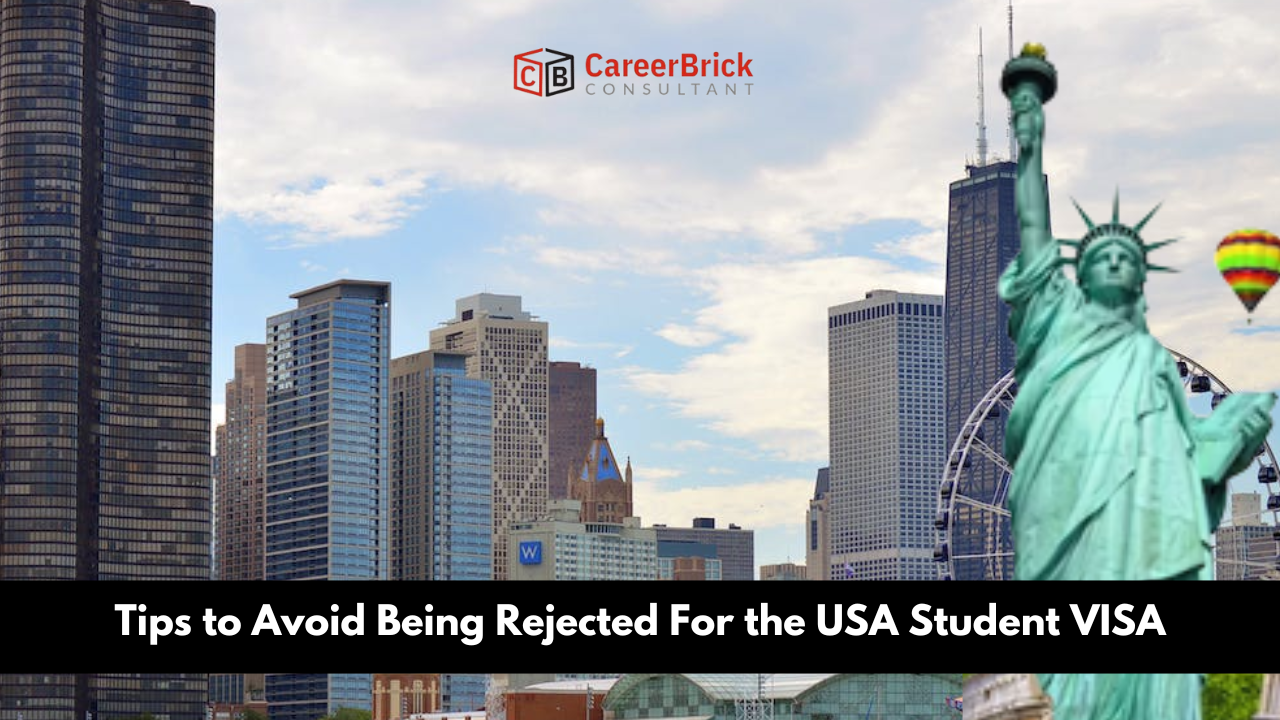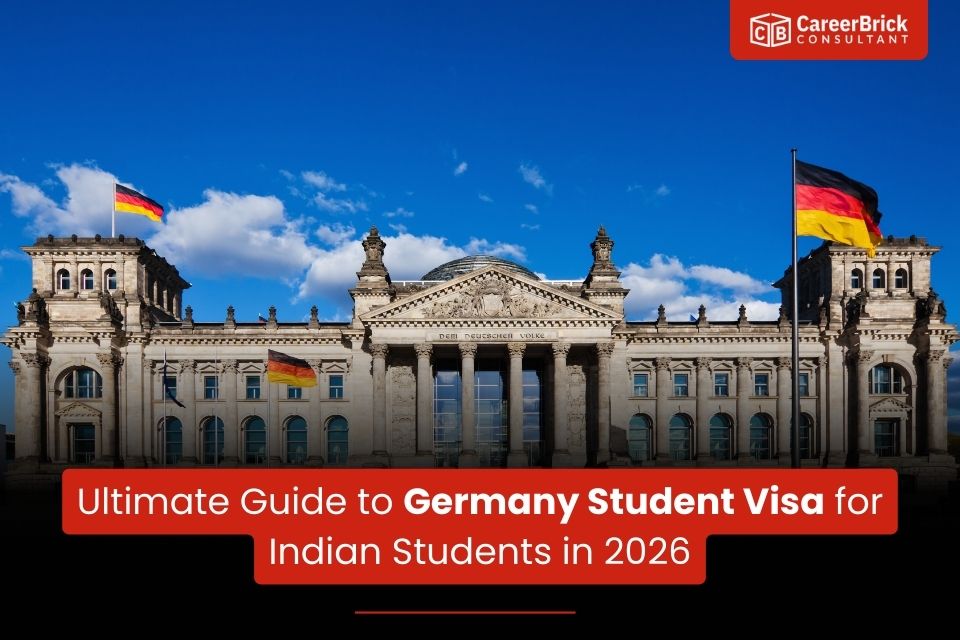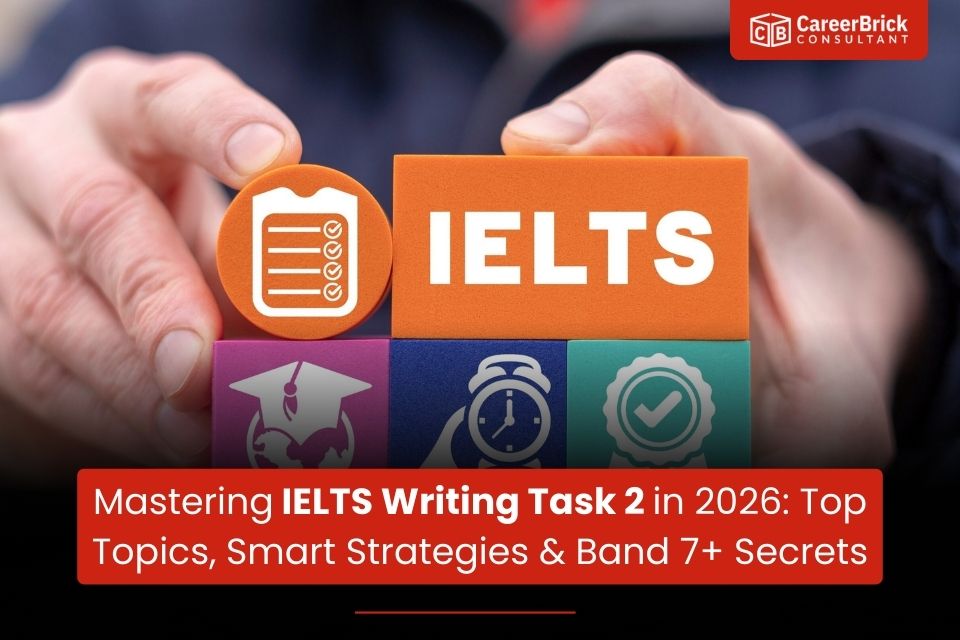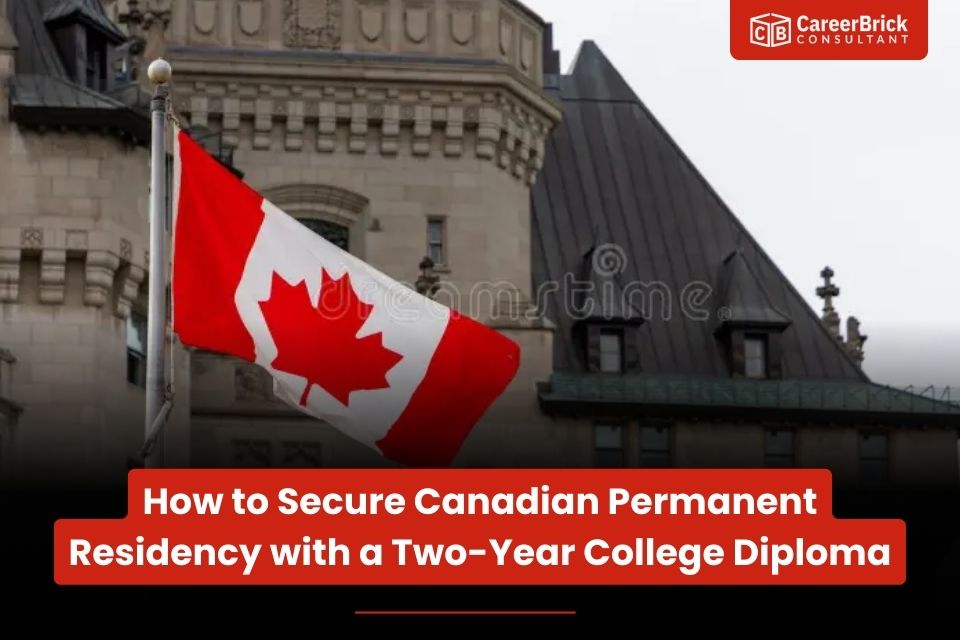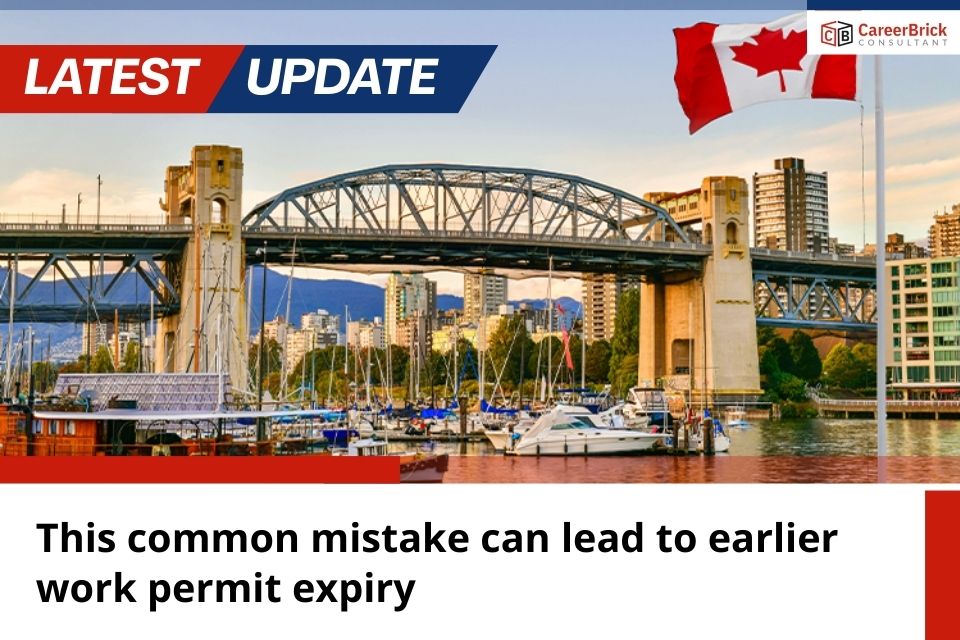Embarking on a journey to pursue higher education in the United States is an exciting and life-changing opportunity. The prospect of studying at prestigious American institutions, immersing oneself in a diverse cultural milieu, and accessing world-class education is undeniably compelling. However, amid the exhilaration lies the crucial step that can make or break your dreams i.e., obtaining a student visa.
The United States has long been a top destination for international students seeking a globally recognized education. Yet, the path to securing a student visa is often filled with uncertainty, rigorous processes, and the possibility of rejection. The daunting fear of being denied a student visa can dampen the enthusiasm of even the most ambitious applicants.
However, fear not, for knowledge is the key to success! Understanding the common pitfalls and adopting the right approach can significantly enhance your chances of obtaining that elusive student visa. In this comprehensive guide, we have compiled a wealth of invaluable tips and advice to steer you away from the rejection zone and towards the gateway of your American dream.
So, whether you're a budding scientist, an aspiring entrepreneur, an artist yearning to create master pieces or a scholar eager to contribute to the world, this blog is tailored to assist you in overcoming the hurdles that may come your way. Let's delve into the essential tips and strategies that will empower you to navigate the student visa application process with confidence for USA.
To avoid being rejected for a student visa to the USA, there are several tips you can follow:
Plan Ahead
Initiating the application process well in advance is a vital step in ensuring a smooth and successful journey towards obtaining a student visa for the United States. This proactive approach allows applicants to accommodate the various steps involved in the process, tackle unforeseen challenges, and demonstrate their genuine intent to study in the country. Let's delve deeper into why starting the application process early is crucial:
1. Completing Necessary Paperwork
Applying for a U.S. student visa involves extensive paperwork, which may include forms, financial documents, academic transcripts, standardized test scores, and acceptance letters from American institutions. Gathering all the required documents can be time-consuming, and in some cases, additional paperwork may be necessary to meet specific visa requirements. Starting early ensures you have enough time to compile and review your paperwork meticulously, reducing the risk of errors and omissions.
2. Scheduling Visa Appointments
For most applicants, obtaining a U.S. student visa requires attending an in-person visa interview at the U.S. embassy or consulate in their home country. Depending on the location and time of the year, visa interview slots may fill up quickly, leading to potential delays in securing an appointment. Initiating the process early allo0ws you to book your interview well in advance, increasing the chances of securing a suitable date and time.
3. Additional Administrative Processing
In some cases, the visa application may undergo administrative processing, which can extend the processing time significantly. This additional review is conducted for various reasons, such as security clearances or verifying information provided in the application. Starting early provides a buffer for any unexpected delays that may arise during this stage.
4. Demonstrating Genuine Intent
U.S. consular officers are trained to assess the authenticity of an applicant's intentions during the visa interview. Applying early shows that you are serious about your study plans and that you have thoroughly considered your academic and career goals in the United States. It reflects your commitment to following the correct legal procedures and complying with visa regulations.
5. Flexibility in Case of Rejection
Despite meticulous preparation, visa rejections can occur due to various reasons. Initiating the process well in advance provides sufficient time to reevaluate your options, address any shortcomings, and reapply if necessary. This flexibility can be critical in salvaging your plans to study in the United States without a significant disruption to your academic timeline.
Understand The Requirements
Research and carefully read through the requirements for a student visa to understand what is expected of you. Make sure you meet all the necessary criteria before applying. The U.S. student visa process can be complex, and each visa category has specific criteria that applicants must meet. Carefully reviewing these requirements ensures that you are well-prepared to submit a complete and accurate application, thereby increasing your chances of a successful outcome. Here's why this step is crucial:
1. Fulfilling Eligibility Criteria
Different student visa categories, such as F-1 or M-1 visas, have distinct eligibility criteria. These may include being accepted by a Student and Exchange Visitor Program (SEVP)-approved institution, demonstrating sufficient financial resources to cover tuition and living expenses, and showing strong ties to your home country, among others. By understanding these criteria, you can assess your eligibility and determine if you qualify for the intended visa category.
2. Submitting Required Documentation
Knowing the necessary documents in advance enables you to gather and organize them efficiently. Typical documents include a valid passport, SEVIS I-20 form (for F-1 visa applicants), financial statements, academic transcripts, standardized test scores, and proof of English proficiency. Meeting these documentation requirements demonstrates your preparedness and commitment to following the visa application process meticulously.
3. Avoiding Errors and Omissions
Failing to meet any of the visa requirements can lead to delays or outright rejection of your application. Careful review and understanding of the criteria help minimize the risk of making mistakes or overlooking essential information. Accuracy and completeness in your application are crucial for a positive visa decision.
4. Efficiently Addressing Concerns
If you find any potential issues with meeting specific requirements, early awareness allows you to address them promptly. For instance, if your financial documents are insufficient, you have time to explore alternative funding options or seek assistance from your chosen educational institution to meet the financial criteria.
5. Strategic Planning for Timeline
Understanding the requirements in advance helps you plan your visa application timeline effectively. Some requirements, such as English proficiency exams or medical examinations, may take time to complete. By knowing these well ahead of time, you can schedule them appropriately, ensuring that your visa application is not delayed.
6. Demonstrating Genuine Intent
Complying with all the requirements and providing the requested documentation reinforces your genuine intent to study in the United States. Consular officers assess the sincerity of your purpose during the visa interview, and a well-prepared application contributes to a positive impression.
Choose The Right Program
Select a credible and recognized educational institution in the USA. Make sure the program you choose aligns with your academic and career goals. It not only sets the foundation for a successful academic experience but also significantly impacts your overall career trajectory. Here's why selecting a credible and recognized educational institution with a program that aligns with your academic and career goals is so important:
1. Quality Education
Credible institutions are known for their high-quality education, experienced faculty, and robust academic resources. Pursuing your studies in such an environment ensures that you receive an education that is respected and valued globally, providing you with a competitive edge in the job market.
2. Visa Eligibility
U.S. student visas (F-1 visas) are only issued to applicants accepted by SEVP-approved institutions. Choosing an accredited institution that appears on the SEVP list is crucial for the visa application process. Consular officers are more likely to approve visas for students who are admitted to reputable institutions.
3. Optimal Learning Experience
Aligning your program with your academic and career goals ensures that you study subjects that genuinely interest you. This creates a conducive and engaging learning environment, allowing you to excel in your studies and make the most of your time in the USA.
4. Research Opportunities
Renowned educational institutions often offer various research opportunities and collaborations with industry partners. Engaging in research projects can deepen your knowledge, broaden your skillset, and establish valuable connections that may benefit your future career.
5. Career Prospects
Employers often value degrees earned from reputable institutions. Graduating from a well-recognized university can open doors to a wider range of job opportunities, both in the USA and internationally.
6. Networking Opportunities
Credible institutions attract students from diverse backgrounds and cultures, creating an enriching and inclusive learning environment. Building a network of peers and professors from around the world can be invaluable for your personal and professional growth.
7. Support Services
Established educational institutions typically offer robust support services for international students. From academic advising to career counseling and assistance with visa-related matters, these services can help ease the transition and enhance your overall experience.
8. Alumni Network
Reputable institutions often have strong alumni networks that extend beyond graduation. This network can serve as a valuable resource for mentorship, job referrals, and guidance as you embark on your post-graduation journey.
In conclusion, selecting a credible and recognized educational institution in the USA with a program that aligns with your academic and career goals is a fundamental decision that shapes your educational experience and future prospects. Researching and choosing the right program not only ensures visa eligibility but also provides access to a wealth of academic resources, support services, networking opportunities, and a pathway to a successful and fulfilling career.
Prepare Your Documents
Gather all the required documents such as your passport, financial statements, acceptance letter from the educational institution, and evidence of ties to your home country. Organize these documents in a neat and organized manner before submitting your application.
To increase your chances of a successful visa application and to avoid being rejected, it's important to carefully prepare your documents and follow these tips:
1. Complete the Online Form DS-160
Fill out the Online Nonimmigrant Visa Application Form DS-160 accurately and truthfully. Keep the DS-160 confirmation barcode, as you will need it for your visa interview.
2. Pay the Visa Application Fee
Pay the required visa application fee and retain the receipt. Payment procedures may vary depending on your country, so make sure to follow the correct process.
3. Schedule Visa Interview
Schedule your visa interview appointment as soon as possible after paying the visa fee. Check the U.S. embassy or consulate website in your country for the specific procedures.
4. Gather Required Documents
Organize and gather all required documents, including:
- Passport: Make sure your passport is valid for at least six months beyond your intended date of entry into the U.S.
- Financial Proof: Documents demonstrating your ability to cover tuition, living expenses, and other costs. This could include bank statements, affidavits of support, scholarship letters, etc.
- Standardized Test Scores: SAT, ACT, GRE, or other relevant scores.
- Academic Transcripts and Certificates.
- Passport-sized photographs meeting U.S. visa photo requirements.
Any other documents required by the specific U.S. embassy/consulate.
6. Financial Documentation: Ensure that your financial documentation is accurate, up-to-date, and clearly shows your ability to cover your education and living expenses in the U.S.
7.Review Embassy/Consulate Guidelines: Check the specific U.S. embassy/consulate website for any additional instructions or requirements for student visa applicants in your country.
Remember that while these tips can help you prepare, there is no guaranteed formula for success. The U.S. visa application process is subject to individual assessment, and each case is unique. If your visa application is rejected, you can reapply after addressing any concerns raised during the initial interview.
Demonstrate Strong Ties To Your Home Country
One of the main concerns of immigration officials is whether you will return to your home country after completing your studies. Provide evidence of your strong ties, such as family connections, a job offer, or property ownership, to demonstrate your intention to return.
1. Family Connections
Highlight close family ties in your home country, such as parents, siblings, or dependents. Provide evidence of these relationships, such as birth certificates or marriage certificates.
2. Employment Prospects
Show that you have promising job opportunities waiting for you upon your return. Provide letters of employment, job offers, or evidence of job interviews.
3. Property Ownership
If you own property or assets in your home country, provide documentation that proves your ownership. This could include property deeds, land titles, or ownership certificates.
4. Financial Ties
Demonstrate financial connections to your home country, such as bank accounts, investments, or ongoing business interests.
5. Educational Intentions
Explain how your U.S. education aligns with your future career goals in your home country. Discuss how the skills and knowledge you gain in the U.S. will contribute to your country's development.
6. Cultural or Social Ties
Emphasize any memberships, community involvement, or cultural affiliations that anchor you to your home country.
7. Healthcare or Family Care
If you have ailing family members or dependents in your home country, it can indicate your need to return and provide care.
8. Country-Specific Factors
Address any unique circumstances in your home country that would necessitate your return, such as mandatory military service, cultural obligations, or specialized job opportunities.
Show Proof Of Financial Support
You need to prove that you have the financial means to support yourself throughout your studies. Provide evidence of sufficient funds, such as bank statements, scholarship letters, or financial aid documents.
1. Bank Statements
Providing recent and detailed bank statements demonstrates your ability to cover your educational expenses. These statements should reflect a consistent and sufficient balance to cover tuition, living costs, and other expenses. It's important to ensure that the statements are in your name or your sponsor's name, are from a reputable financial institution, and are properly translated if not in the official language of the institution.
2. Scholarship Letters
If you have been awarded a scholarship, grant, or financial award, include official documentation from the scholarship provider. This could be a letter outlining the scholarship amount, duration, and any conditions. Such letters validate your ability to fund your studies and living expenses without relying solely on personal savings.
3. Financial Aid Documents
If you're receiving financial aid from a government agency, educational institution, or other organization, include official documents that detail the terms and amount of aid you will receive. These documents reinforce your financial capacity and provide evidence of external support.
4. Affidavit of Support
Some institutions or visa authorities may require a formal affidavit of support. This is a legally binding document in which a sponsor, often a family member or close relative, guarantees to provide financial support to the applicant throughout their studies. The sponsor's financial information and willingness to support you financially are highlighted in this document.
5. Proof of Income
In some cases, you might need to provide evidence of your or your sponsor's regular income, such as pay stubs, tax returns, or employment letters. This demonstrates a stable source of funds to cover educational expenses.
6. Property Valuation or Assets
If you own valuable assets like property, stocks, or bonds, you might include official documents attesting to their value. These assets can serve as collateral or additional proof of your financial capability.
7. Educational Loan Approvals
If you have secured an educational loan, include documentation from the lending institution confirming your approved loan amount and terms. This shows your ability to finance your studies through loans.
8. Personal Statement
Alongside the formal documents, you could provide a personal statement outlining your financial plan for supporting your studies. This could explain how you intend to manage your finances, especially if you have a combination of funding sources.
It's important to carefully review the specific requirements of the educational institution or visa application you're dealing with, as different organizations might have variations in their expectations for proof of financial support. Always make sure your documents are genuine, accurately represent your financial situation, and are presented in a clear and organized manner to enhance your chances of a successful application.
Be Honest And Confident During Your Interview
If you are called for an interview, be honest about your intentions and answer all questions confidently. Be prepared to explain why you chose the specific course and how it aligns with your future plans. Being honest and confident during the interview can greatly enhance your chances of success. Here's an explanation of the key points to consider:
1. Honesty Matters
Being truthful is fundamental. If you're dishonest, it could lead to serious consequences, including rejection or even being banned from future applications. Be straightforward about your intentions, your academic background, and any financial matters. If there are weaknesses in your application, address them honestly rather than attempting to hide or manipulate information.
2. Confidence and Preparedness
Confidence demonstrates your self-assuredness and can leave a positive impression. Before the interview, thoroughly research the program, institution, or visa requirements. Understand the core aspects of your chosen course and how it fits into your future plans. This preparation will help you answer questions confidently and articulate your goals effectively.
3. Course Alignment
Be ready to explain why you've chosen the specific course and how it aligns with your career aspirations. Highlight the relevant skills, knowledge, and experiences you hope to gain and how they contribute to your long-term goals. Provide specific examples of how the course content, faculty, or facilities uniquely position the program to help you achieve your objectives.
4. Show Passion and Enthusiasm
Express genuine enthusiasm for the opportunity. Share what excites you about the course, any relevant projects or research you look forward to, and how these experiences will contribute to your personal and professional growth. Passionate and authentic responses can leave a lasting impression on the interviewers.
5. Address Weaknesses
If you have any academic or experiential gaps in your application, address them proactively. Explain how you plan to overcome these challenges and emphasize your determination to excel despite any setbacks. Demonstrating your ability to learn from past experiences can reflect your resilience and commitment to success.
6. Personal Experiences
Share anecdotes or personal experiences that have motivated your decision to pursue the chosen course. Whether it's a specific event, mentor, or realization, weaving your personal story into your responses can make your interview more memorable and relatable.
7. Ask Thoughtful Questions
Towards the end of the interview, if given the opportunity, ask insightful questions about the program, faculty, resources, or any relevant opportunities. This demonstrates your genuine interest and engagement in the application process.
8. Practice and Feedback
Prior to the interview, practice with a friend or family member. Simulate common interview questions and receive feedback on your responses. This practice can help refine your answers and boost your confidence.
9. Body Language and Communication
Pay attention to your body language, eye contact, and tone of voice during the interview. Maintain a positive and respectful demeanor, and speak clearly and articulately.
Remember, the interview is a chance to showcase your personality, motivations, and aspirations beyond what's written in your application. Being honest, confident, and well-prepared will leave a strong impression and enhance your chances of being selected for your desired program or opportunity.
Seek Assistance If Needed
If you are unsure about any part of the application or interview process, seek guidance from an immigration lawyer or a reputable educational consultant. They can help ensure that your application is complete and accurate. Here's an expanded explanation of why and how to seek their guidance:
1. Expertise and Experience
Immigration lawyers and educational consultants are experts in their fields. They possess in-depth knowledge of the legal and procedural aspects of visa applications, scholarship requirements, and educational admissions. Their experience allows them to guide you through potential pitfalls and provide personalized advice tailored to your specific situation.
2. Application Accuracy
One of the key roles of professionals in this context is to ensure the accuracy and completeness of your application. They can review your documents, forms, and statements to ensure that all necessary information is included and correctly presented. Mistakes or omissions in your application can lead to delays or rejections, which can be costly and frustrating.
3. Customized Guidance
Professionals can help you strategize and create a strong application package that highlights your strengths, experiences, and motivations. They can guide you on how to present your case in the most compelling way, increasing your chances of success.
4. Navigating Legal Requirements
Immigration laws and regulations can be complex and subject to change. Immigration lawyers are well-versed in the latest legal requirements and can help you understand the specific documentation, financial, and eligibility criteria for your student visa application.
5. Interview Preparation
Educational consultants can provide valuable guidance on interview preparation. They might conduct mock interviews, offering constructive feedback on your responses, body language, and overall presentation. This practice can help you feel more confident and composed during the actual interview.
6. Time and Stress Management
Applying for visas and scholarships, along with preparing for interviews, can be time-consuming and stressful. Professionals can help streamline the process, ensuring you meet deadlines and minimizing unnecessary stress during a critical period.
7. Access to Resources
Educational consultants often have access to resources and networks that can benefit your application. They might be familiar with scholarship opportunities, financial aid options, or specific programs that align with your goals.
8. Changing Regulations
Immigration regulations and application requirements can change over time. Professionals stay up-to-date with these changes and can advise you on any recent developments that might impact your application.
9. Peace of Mind
Engaging professionals provides you with peace of mind, knowing that you're receiving accurate information and guidance. This confidence can positively influence your overall application experience.
Conclusion
When seeking assistance, it's important to choose reputable professionals. Look for licensed immigration lawyers or well-established educational consultants with a track record of successful outcomes. While their services may involve a cost, consider it an investment in your future education and career. Remember that while professionals can provide valuable guidance, you should also actively participate in the process, providing them with accurate information and cooperating fully to ensure the best possible outcome.
Remember, each case is unique, and there are no guarantees of approval. However, by following these tips and preparing yourself thoroughly, you can increase your chances of a successful student visa application to the USA. Stay focused, organized, and committed to showcasing your potential to contribute to the academic community and your future career.
